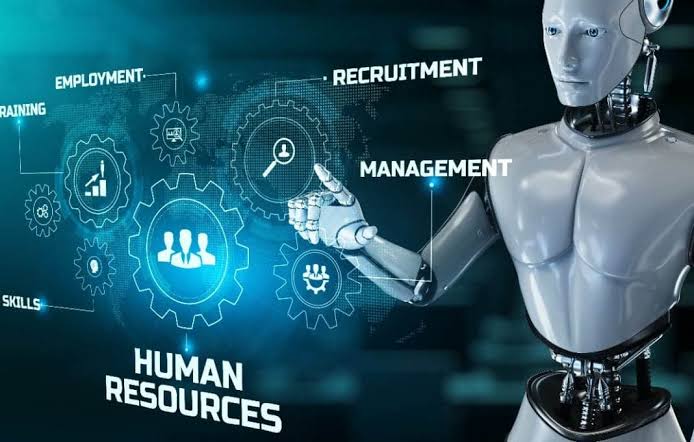Explore how AI is revolutionizing human resources by streamlining recruitment and enhancing talent management. Discover the benefits, applications, and future prospects of AI in HR, and learn about the challenges and ethical considerations associated with its implementation.
The integration of artificial intelligence (AI) into human resources (HR) is transforming how organizations handle recruitment and talent management. By automating and enhancing various HR processes AI technologies improve efficiency, accuracy and overall effectiveness in managing human capital. This article delves into impact of AI on HR. It explores benefits applications and future prospects
The Evolution of AI in HR
AI's influence on HR has evolved from simple automation to sophisticated data-driven solutions. Early applications included basic tasks like scheduling interviews or managing job postings. Today, AI tools leverage machine learning algorithms. They use natural language processing to provide deeper insights and more complex functionalities.
Enhancing Recruitment Processes
One of most significant areas where AI is making difference is in recruitment. AI-driven tools streamline hiring process in several ways
1. Resume Screening: AI algorithms can sift through thousands of resumes quickly. They identify candidates who match specific job requirements. This reduces time spent on manual screening and helps recruiters focus on top-tier candidates
2. Job Matching: AI systems can match job seekers with suitable positions based on skills experiences and career goals. This improves quality of hires by aligning candidates with roles that best fit their profiles
3. Predictive Analytics: AI tools can predict candidate success by analyzing historical data and identifying traits associated with high performance. This helps in making informed decisions about potential hires
4. Chatbots for Initial Screening: AI-powered chatbots can conduct preliminary interviews. They answer candidates' questions and gather initial information. This automates repetitive tasks and provides more engaging candidate experience
Improving Talent Management
Beyond recruitment AI also plays crucial role in talent management
1. Employee Development: AI can analyze employee performance data to identify skill gaps and recommend personalized training programs. This ensures employees receive relevant development opportunities aligned with career aspirations
2. Performance Management: AI systems can track employee performance in real-time. This provides managers with actionable insights and predictive analytics. It helps in setting realistic goals, providing timely feedback and addressing performance issues proactively
3. Employee Engagement: AI tools can monitor employee sentiment through surveys and feedback mechanisms. By analyzing patterns in employee responses organizations can identify areas for improvement and implement strategies to boost engagement and retention
4. Workforce Planning: AI can assist in workforce planning by analyzing current and future talent needs. It helps organizations anticipate staffing requirements, manage succession planning and optimize workforce allocation
Addressing Challenges and Ethical Considerations
While AI offers numerous benefits its implementation in HR also raises challenges and ethical considerations
1. Bias and Fairness: AI systems can inadvertently perpetuate biases if they are trained on biased data. It is crucial to ensure AI tools are designed to promote fairness and inclusivity in recruitment and talent management processes
2. Data Privacy: The use of AI involves handling sensitive employee data. Organizations must implement robust data protection measures to ensure compliance with privacy regulations and safeguard employee information
3. Transparency: AI-driven decisions can sometimes lack transparency. This makes it difficult for employees to understand how decisions are made. Providing clear explanations of AI processes and involving human oversight can address this issue
4. Adaptation and Training: Successful integration of AI in HR requires adaptation from HR professionals. Training and support are essential to help HR teams understand and effectively use AI tools
The Future of AI in HR
The future of AI in HR holds exciting possibilities. As technology continues to advance AI is expected to become even more integrated into HR processes. Emerging trends include:
1. Advanced Personalization: AI will offer increasingly personalized experiences for both candidates and employees. It will tailor interactions and recommendations to individual needs.
2. Enhanced Predictive Analytics: AI will provide more accurate predictions regarding employee performance, retention and organizational needs. This will enable proactive decision-making.
3. Greater Integration with Other Technologies: AI will increasingly integrate with other technologies like blockchain and augmented reality. This will further enhance HR capabilities and processes.
4. Focus on Ethical AI: There will be growing emphasis on developing and implementing AI systems that are ethical transparent and fair. This addresses concerns related to bias and privacy.
In conclusion AI is revolutionizing human resources by streamlining recruitment and enhancing talent management. Challenges exist but potential benefits of AI-driven HR solutions are substantial. Embracing AI is crucial. Addressing associated challenges can help organizations improve efficiency. It can also foster employee development and drive overall success in managing human capital
